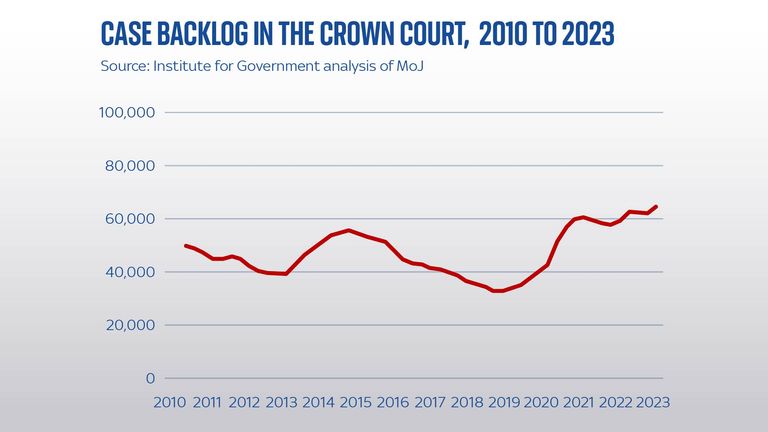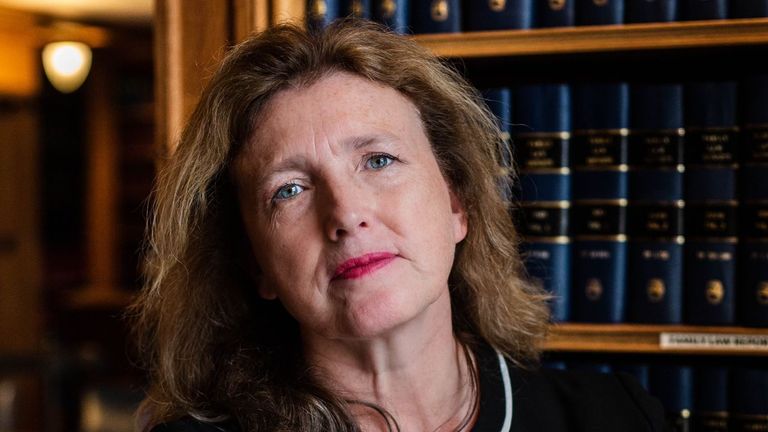
Almost 900 sexual offences were committed between 2020 and 2022 by people on bail, according to statistics from the Ministry of Justice (MoJ).
A Freedom of Information request by Sky News found the figure totalled 887 for the three years and had risen annually, with 184 offences committed in 2020, increasing to 326 in 2021 and 377 in 2022.
Sky News was refused the data for 2023 ahead of broader crime statistics being published on Thursday morning, and has now been told to submit another FOI request to access the information – meaning at least 20 days until the figures are revealed.
However, the trend indicates the number of offences is likely to have tipped over the 1,000 mark for the four-year period.
Charities and legal professionals warned the numbers were a “disastrous consequence” of a “broken” court system, which is seeing those on bail facing record delays before their cases are heard, putting them “at risk of reoffending for extended periods”.
The statistics come after claims defendants deemed “lower risk” could be released on police bail without a court hearing as part of emergency measures triggered on Wednesday to tackle prison overcrowding – with hundreds of bail hearings being delayed in case the defendant is placed on remand but has no prison cell to go to.
An MoJ source told Sky News it would be a decision for the police if they chose to release someone, not an order from the department.
But with police cells being used to house prisoners in overcrowded areas – another emergency procedure triggered last week – there could be pressure to make room.
The chief executive of The Survivors Trust – a national organisation helping rape and sexual abuse support services – said people who had been attacked by those on bail felt “let down” by the government.
“There can be a lot of fear exactly around that happening,” Fay Maxted told Sky News. “Many, many survivors [of sexual offences and other crimes] report them because they want to protect others.
“They’re not driven by revenge or anything, but they are wanting to make things better and hoping to make the community a safer place.
“So it’s devastating to then find that actually the person that you made the report about is out and about and in the community.”
Read more:
Should courts sit 24/7 to tackle backlogs?
‘I felt like I was really on trial’ – the human cost of court backlogs
Ms Maxted laid much of the blame at the door of delays in the court system, leaving people on bail for longer, and “creating a lot of disastrous consequences”.
“People can be questioned and then released on bail, and it might be a year, it might be two years before they appear in court,” she said. “It’s really unacceptable. We’ve got a broken system at the moment.
“And I’m not always sure that everyone appreciates the impact of sexual violence and abuse – the potentially lifelong impact on someone’s health and well-being.”
The charity chief’s concerns were backed up by the Criminal Bar Association, who said the figures showed “a systemic failure” of government to fix court delays.
Analysis from the organisation used the average time for a rape trial with a bailed defendant to conclude after charge as an example – saying it had risen 80% in five years to around 18 months, with many court dates now being fixed in summer 2026 for charges made last year or early in 2024.
Chair of the CBA, Tana Adkin KC, told Sky News: “The number of sexual offences committed by those on bail for previous untried offences more than doubled between 2020 and 2022.
“This indicates a systemic failure to deliver on a core government duty to protect all citizens from harm.”
She pointed to a lack of investment in the criminal barristers required to prosecute and defend cases saying, without it, charges could not be “swiftly tried” in court and there would be “dire consequences for the innocent unable to clear their name and the culpable at risk of reoffending on bail for extended periods”.
Ms Adkin added: “Years of underfunding in the criminal justice professionals tasked with ensuring offences once charged are litigated has real-life consequences for defendants, witnesses, complainants and victims as well as their families, all caught up in the historic delays in our criminal courts.”
The Survivors Trust is calling for sexual offences to be tried in a court with a panel of judges and lay-people advisers to help victims through the process, as well as speed it up – and Ms Maxted believes this would also cut down the number of offences committed while people are on bail.
“You wouldn’t want a situation where there are unfair trials,” she said. “There has got to be a process where everyone is able to present their case.
“But at the moment we are leaving victims vulnerable and then leaving communities vulnerable and the statistics are proving this.
“If someone’s already been arrested and then released on bail and then they re-offended, how much more do they have to do to prove that they are a danger in the community?”
The MoJ statistics revealed through Sky News’s Freedom of Information request also showed 7,693 offences of violence against a person – ranging from assault to murder – were committed between 2020 and 2022 by someone who was on bail.
And there were a further 17,243 theft offences, along with 1,137 robbery offences, and 411 incidents of criminal damage and arson.
The figures will come as an embarrassment to a department already under pressure over its handling of not just the courts system, but the prison service as well.
As well as the changes to bail hearings mentioned above, ministers have issued orders that prisoners serving sentences of less than four years be freed up to 70 days early from this month, among predictions male institutions could be full by June.
During Prime Minister’s Questions, Rishi Sunak said no one would be released “if they were deemed a threat to the public” or had committed a “serious offence”.
But Labour accused him of “misleading” the Commons, pointing to fresh reports from the chief inspector of prisons that some prisoners who had already been let out were a “risk to children” and had a “history of stalking, domestic abuse, and being subject to a restraining order”.
Sky News has approached the Ministry of Justice for comment.














